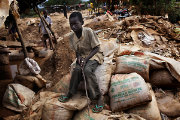 A young boy sits on a stack of ore sacks in the mining processing site in Bagega village. A young boy sits on a stack of ore sacks in the mining processing site in Bagega village.
|
 Nigeria: Death Stalking Lead-Poisoned Children Nigeria: Death Stalking Lead-Poisoned Children
(Abuja) – The Nigerian government’s failure to produce promised funding to address the worst lead poisoning outbreak in modern history is leaving thousands of children to die or face lifelong disability, the Nigerian Youth Climate Action Network (NYCAN) and Human Rights Watch said today. The organizations opened a social media campaign on December 6, 2012, urging people to post comments to President Goodluck Jonathan’s official Facebook page, asking him why he has broken his promise to release funding for the cleanup of lead-contaminated areas in Zamfara State.
“More than 400 children in Zamfara State have died from lead poisoning according to official estimates,” said Babatunde Olugboji, deputy program director at Human Rights Watch. “Unless the promised funds are released immediately, cleanup of the contaminated areas won’t be able to start until after next year’s rainy season, leaving thousands more children at risk of death and permanent disability.”
In May, the government pledged close to US$5 million to clean up areas that had been contaminated with lead during artisanal gold mining operations because of high levels of lead in rock ore. The funds were also to be used to put safe mining practices into effect, such as introducing processing equipment that reduces the risks of lead exposure.
In the village of Bagega, the most seriously contaminated town in the area, since Human Rights Watch researchers last visited in May, the family featured in a Human Rights Watch video that had already lost 10 children to lead poisoning, has seen another child die from lead poisoning.
Medecins Sans Frontieres (MSF), an independent international organization for medical humanitarian aid that has provided life-saving treatment to more than 2,000 children in Zamfara, cannot treat the thousands of children who remain in urgent need until environmental cleanup has been completed because treating children when they are still actively exposed to lead makes their bodies more susceptible to the harms of lead poisoning.
Over the last three years, TerraGraphics, a US-based company, has worked with local Nigerian staff to clean up seven villages in Zamfara and has provided initial support to clean up Bagega, which has about 8,000 residents. The environmental cleanup of Bagega, which will only happen if President Jonathan releases the promised funds, must begin by mid-January to ensure it can be completed before the rainy season begins.
“If President Jonathan does not release these funds right away, children in Bagega will be forced to continue living in poisoned homes,” said Hamzat Lawal, co-founder of NYCAN and a technical adviser to the group. “Children in Bagega are dying. If we wait another year to clean up the conditions that are poisoning these children, more children will die or become permanently disabled.”
Lawal is also national coordinator of African Youth Initiative on Climate Change – Nigeria (AYICC-Nigeria) and is overseeing the Follow The Money (www.followthemoneyng.org ) campaign to ensure transparency and accountability for any funding released for the cleanup of Bagega.
Artisanal gold mines are found throughout Zamfara State. High levels of lead in the earth and the use of rudimentary mining methods have resulted in an ongoing epidemic of lead poisoning among children. Children are particularly susceptible to the harm caused by lead, and high levels of lead exposure can cause brain, liver, kidney, nerve, and stomach damage, as well as permanent intellectual and developmental disabilities.
Research by Human Rights Watch in Zamfara in late 2011 found that children are exposed to lead when they process ore in the mines, when their miner relatives return home covered with lead dust, and when the lead-filled ore is manually or mechanically crushed at home. Children can also be exposed to toxic lead in contaminated water and food.
“We have reached a crisis point in Zamfara,” Olugboji said. “Thousands of children live in a toxic environment and are in urgent need of treatment. President Jonathan needs to make good on his promise and release the promised funds before the window of opportunity before the rainy season closes. But he needs to act right away.”
(2012-12-6/hrw)
|





 A young boy sits on a stack of ore sacks in the mining processing site in Bagega village.
A young boy sits on a stack of ore sacks in the mining processing site in Bagega village.